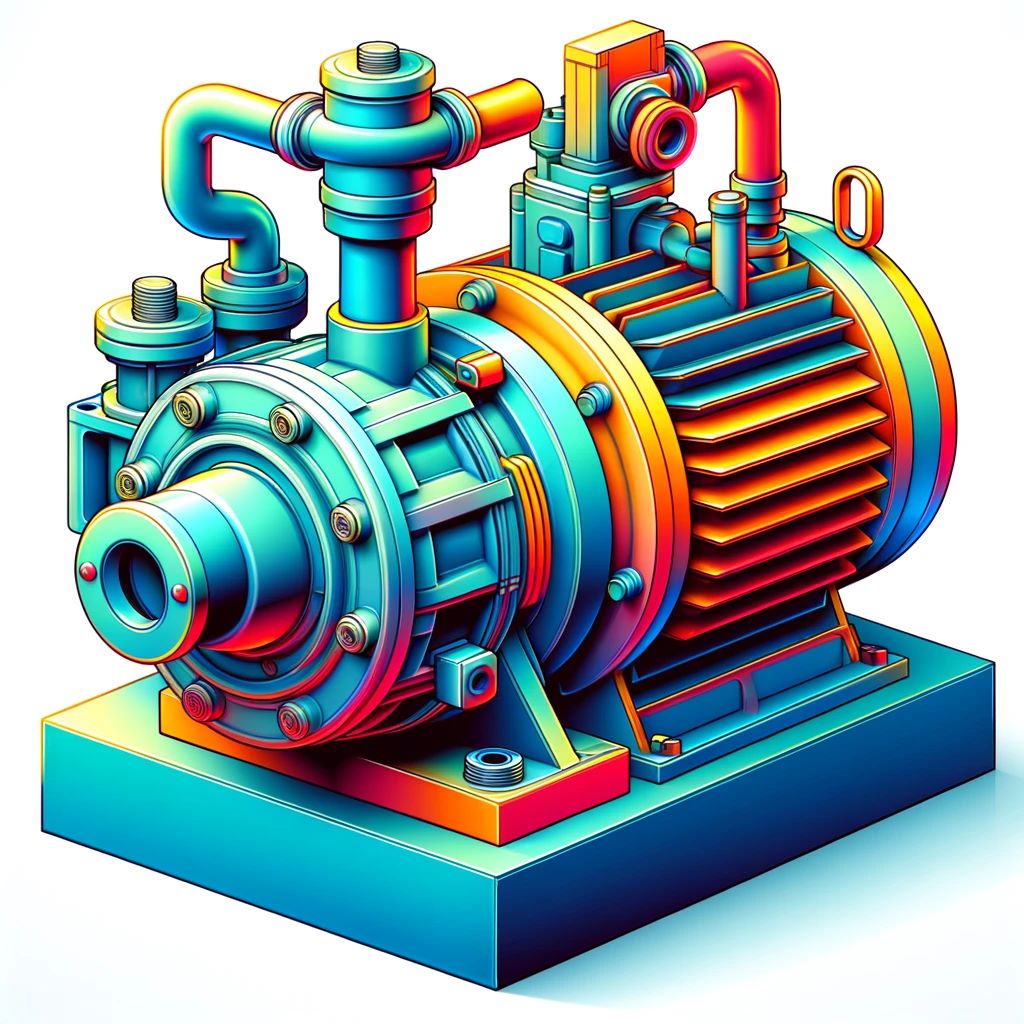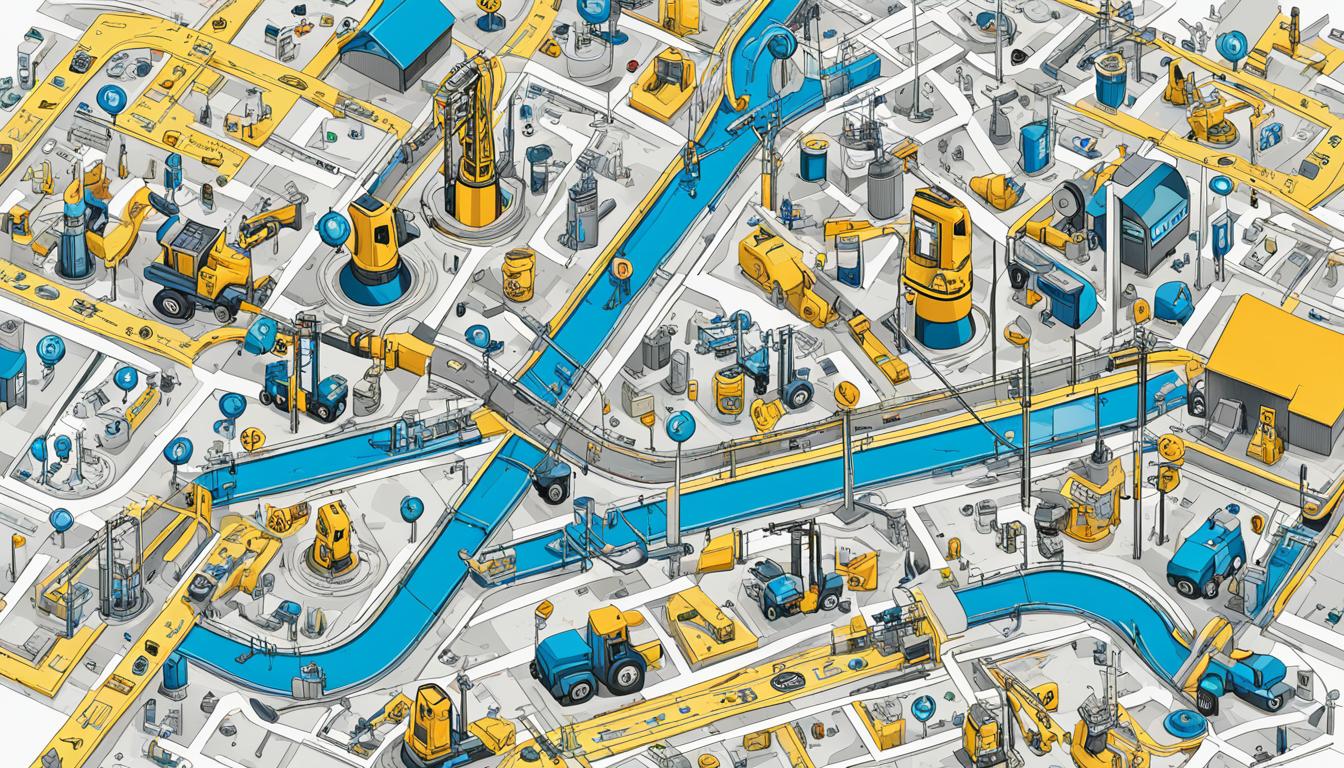This post contains affiliate links.
Did you know that local well codes and regulations are in place to ensure the safe installation and operation of well systems? These regulations play a crucial role in protecting water resources and maintaining the integrity of well systems across the United States.
In this guide, we will provide essential tips for understanding and navigating local well codes and regulations. Whether you are a homeowner, contractor, or business owner, it is important to be aware of and comply with these regulations to ensure the proper functioning and safety of your well system.
Key Takeaways:
- Local well codes and regulations are in place to ensure the safe installation and operation of well systems.
- Understanding and complying with well codes is essential for protecting water resources and maintaining the integrity of well systems.
- Adhering to well codes and regulations helps prevent costly repairs and ensures the longevity of well systems.
- Well permits are a crucial requirement before installing a new well or making significant changes to an existing one.
- Maintaining regular well inspections and following maintenance guidelines is important for the continued performance and safety of well systems.
Understanding Local Well Codes and Regulations
Local well codes and regulations are crucial for ensuring the safe and effective operation of well systems. They are established by state and local authorities to regulate every aspect of well design, installation, and maintenance. As a homeowner, contractor, or stakeholder, understanding these codes is essential to comply with the requirements and uphold the proper functioning and safety of wells in your area.
Well codes cover a range of factors related to well systems, including plumbing, water supply, drainage, and more. They outline the specific requirements and standards that must be followed to ensure the proper functioning of wells. By adhering to these codes, you can avoid potential issues like contamination, leaks, or inadequate water supply.
Navigating well codes and regulations may seem challenging, but it is crucial for staying compliant and protecting the integrity of your well system. Here are some key points to keep in mind:
- Familiarize yourself with local codes: Each state and locality may have its own set of well codes and regulations. Take the time to research and understand the specific requirements in your area.
- Consult with professionals: If you are uncertain about any aspect of the well codes or regulations, it is recommended to seek expert guidance. Plumbers, well contractors, or regulatory officials can provide valuable insights and clarification.
- Stay updated: Well codes and regulations may undergo revisions or updates over time. It is important to stay informed about any changes that may affect your well system’s compliance. Subscribe to newsletters or updates from local authorities responsible for well regulations to stay up to date.
Staying compliant with well codes and regulations ensures the proper functioning and safety of your well system. By understanding and adhering to these requirements, you can avoid potential penalties, protect water resources, and maintain a reliable source of clean water.
Effectively Navigating Well Regulations
One of the key challenges in understanding local well codes and regulations is ensuring compliance with the complex requirements. Here are some tips to help you effectively navigate well regulations and stay compliant:
- Thoroughly review the well code requirements: Take the time to carefully read and understand the specific well code requirements for your area. Pay attention to details such as well construction standards, pump specifications, electrical connections, and water quality guidelines.
- Seek professional assistance when needed: If certain aspects of the well codes are unclear or require specialized knowledge, consult with a licensed professional such as a well contractor or plumber. They can provide guidance and ensure that your well system meets all the necessary regulations.
- Keep accurate records: It is important to maintain detailed records of the installation, maintenance, and repairs of your well system. This includes permits, inspections, water quality tests, and any additional documentation required by local authorities. These records can demonstrate your compliance with well codes and regulations in case of any inquiries or audits.
- Regularly monitor and maintain your well system: Conduct routine inspections and maintenance of your well system to identify and address any potential issues before they escalate. This includes checking the well casing, pump, electrical connections, and water quality. By implementing a proactive maintenance plan, you can ensure the long-term functionality and compliance of your well system.
By understanding local well codes and regulations and following these best practices, you can navigate the complexities of well regulations more effectively and maintain a compliant and safe well system.
The Importance of Well Permits
Well permits are a crucial requirement in many jurisdictions before installing a new well or making significant changes to an existing one. These permits ensure that well systems comply with local codes and regulations, meet safety standards, and protect water resources. Obtaining a well permit involves submitting an application, providing necessary documentation, and paying any associated fees. It is important to adhere to the permitting process to avoid potential fines and penalties.
The Role of Well Permits
Well permits serve as a regulatory mechanism to ensure that proper well construction and installation practices are followed. They help safeguard groundwater quality and prevent contamination by ensuring that wells are located at safe distances from potential sources of pollution. By obtaining a well permit, you are not only complying with local regulations but also taking a proactive step in protecting the environment and public health.
Obtaining a Well Permit
When applying for a well permit, you will need to complete an application form provided by the local authority responsible for issuing permits. The application usually requires information such as the proposed well’s location, depth, and intended use. In addition to the application, you may be asked to provide supporting documents, such as well diagrams, construction plans, and proof of ownership or authorization.
Once your application is submitted, it will undergo a review process to ensure compliance with local regulations. This review may include an assessment of the proposed well’s impact on nearby water sources and the surrounding environment. Depending on the jurisdiction, additional inspections or tests may also be required before a permit is issued.
Benefits of Well Permits
Obtaining a well permit offers several benefits beyond compliance with regulations. It provides peace of mind, knowing that your well system meets safety standards and is less likely to pose health risks or environmental harm. Well permits also help establish a record of ownership and assist in property valuation when selling or refinancing your property.
Responsibilities and Compliance
After obtaining a well permit, it is essential to comply with any conditions or requirements outlined in the permit. This includes adhering to maintenance schedules, conducting regular inspections, and promptly reporting any changes or issues with the well system. Failure to comply with the permit conditions can result in penalties, fines, or even revocation of the permit.
The Bottom Line
Well permits are not just bureaucratic hurdles; they play a vital role in ensuring the proper installation, maintenance, and operation of well systems. By obtaining a well permit, you demonstrate your commitment to environmental stewardship, protect water resources, and contribute to the overall safety of your community. So, when considering a new well or modifications to an existing one, remember the importance of obtaining a well permit and following the necessary regulations.
Well Inspection and Maintenance
Regular well inspections and maintenance are crucial for the continued performance and safety of your well system. By following well inspection guidelines and implementing a maintenance routine, you can prevent issues and ensure the longevity of your well.
During a well inspection, it is important to check various components of your well system. These include:
- Well casing: Inspect the casing for any signs of damage, corrosion, or leaks. Addressing these issues promptly can prevent contamination of your well water.
- Well pump: Test the pump’s performance and ensure it is functioning properly. Malfunctioning pumps can lead to low water pressure or even system failure.
- Electrical connections: Check the electrical connections to ensure they are secure and free from any damage. Faulty connections can disrupt the operation of your well system.
- Water quality: Regularly test the water quality to detect any signs of contamination or changes in water composition. Well water testing is essential for identifying potential health risks.
In addition to inspections, routine maintenance tasks should be performed to keep your well system in optimal condition:
- Cleaning and disinfecting: Regularly clean and disinfect the well to remove any built-up sediment or bacteria that could affect water quality.
- Water quality testing: Test the water quality periodically to ensure it meets the necessary standards for consumption and other uses.
- Pump and pressure system: Check the pump and pressure system regularly to ensure proper functioning. This includes monitoring pressure levels and addressing any abnormalities.
By prioritizing well inspection and maintenance, you can address potential issues before they escalate and avoid costly repairs. It also helps to ensure that you and your family have access to clean, safe, and reliable well water.
Expert Tip: Conduct an Annual Well Inspection
According to expert guidelines, it is recommended to conduct a comprehensive well inspection at least once a year. This annual inspection allows for early detection of any issues and ensures ongoing compliance with well regulations.
Remember, a proactive approach to maintaining your well system is the key to its longevity and your peace of mind. Schedule regular inspections and stay on top of maintenance tasks to enjoy clean and reliable well water for years to come.
Hiring Qualified Contractors
When it comes to installing or repairing a well system, hiring qualified contractors is crucial. Well installation and maintenance require specific knowledge and expertise to ensure compliance with local well codes and regulations.
It is important to hire licensed plumbers or well contractors who have the necessary experience and qualifications. By hiring professionals, you can ensure that your well system is installed or repaired correctly and meets all regulatory requirements.
Qualified well contractors and licensed plumbers have the expertise to:
- Design and install well systems: They have the knowledge to assess your specific needs, plan the installation, and select the appropriate equipment for your well system.
- Ensure compliance with well codes: Well contractors and licensed plumbers are familiar with local well codes and regulations. They will ensure that your well system meets all the necessary requirements for safe and efficient operation.
- Conduct inspections and maintenance: Regular inspections and maintenance are essential for the longevity and performance of your well system. Qualified contractors have the skills to identify any issues and provide the necessary maintenance and repairs.
By hiring professionals, you can have peace of mind knowing that your well system is in capable hands. They will ensure that your well is installed or repaired correctly, minimizing the risk of costly mistakes or non-compliance with regulations.
Hiring qualified contractors is crucial for the proper installation and maintenance of your well system. Their expertise and knowledge of local well codes and regulations will ensure that your well meets all safety and compliance requirements.

- Research local well contractors: Look for reputable well contractors in your area. Read reviews, check their qualifications, and ask for recommendations from friends or neighbors who have well systems.
- Verify licenses and certifications: Make sure the contractors you consider hiring are properly licensed and certified. This ensures they have the necessary training and knowledge to work on well systems.
- Request references: Ask contractors for references from previous clients. Contact these references to get an idea of their experience working with the contractor and the quality of their work.
- Obtain multiple quotes: To ensure a fair price, obtain quotes from multiple well contractors. Compare the prices, but also consider the contractor’s reputation, experience, and qualifications.
- Ask about warranties and guarantees: Inquire about warranties or guarantees on the work and equipment. A reputable contractor will stand behind their work and offer warranties to protect you from any potential issues.
Remember, hiring qualified well contractors is an investment in the safety and longevity of your well system. Don’t settle for inexperienced or unqualified professionals who may not be familiar with local codes and regulations.
Resources for Understanding Well Codes and Regulations
Understanding local well codes and regulations can be complex, but there are resources available to help. Plumbing code books, provided by organizations such as the International Association of Plumbing and Mechanical Officials (IAPMO), offer comprehensive information on well codes and regulations. Additionally, many state and local authorities provide online materials, fact sheets, and contact information for further guidance. Utilizing these resources can help you navigate and understand the specific requirements of your local well codes.

“Plumbing code books are the go-to resource for professionals and individuals seeking to understand well code regulations. They provide detailed information on plumbing practices, design standards, and installation guidelines specific to well systems. By referring to these code books, you can gain a comprehensive understanding of the requirements and best practices for your well.”
- Plumbing code books, such as those published by IAPMO, are comprehensive resources for well code regulations.
- State and local authorities often provide online materials and fact sheets to guide individuals in understanding well codes.
- Contacting local well code enforcement agencies can provide additional guidance and clarification on specific requirements.
By utilizing these well code resources, you can ensure that your well system meets the necessary standards and requirements, promoting safety and compliance.
Staying Informed and Up to Date
Local well codes and regulations are not set in stone. They undergo periodic updates and changes to adapt to evolving standards and industry practices. It is important for individuals and stakeholders to stay informed about these regulatory updates to ensure continued compliance with well codes and regulations.
One of the best ways to stay informed is by subscribing to newsletters or updates from state and local authorities responsible for overseeing well regulations. By receiving timely information directly from the source, you can stay up to date with well code updates, regulatory changes, and any new requirements that may affect your well system.
Attending workshops, seminars, and industry conferences can also provide valuable insights into the latest developments in well regulations. These events often feature experts and professionals who share their knowledge, best practices, and experiences. By attending these gatherings, you can gain a deeper understanding of well code compliance and learn from the collective wisdom of industry leaders.
| Benefits of Staying Informed | How to Stay Informed |
|---|---|
|
|
Staying informed and up to date with well regulations not only helps you comply with legal requirements but also ensures the longevity and performance of your well system. By being proactive and knowledgeable, you can address any regulatory changes promptly and take appropriate action to ensure your well system remains safe, efficient, and in compliance.

Common Violations and Penalties
Non-compliance with local well codes and regulations can have serious consequences, including penalties and legal actions. It is crucial to understand and adhere to these regulations to avoid violations and their associated penalties.
Common Violations
Violations of well codes can occur in various areas, leading to potential issues with the well system. Some common violations include:
- Improper well construction: Failing to follow the specified construction guidelines can result in structural weaknesses or contamination risks.
- Failure to obtain necessary permits: Installing or modifying a well system without the required permits can lead to significant penalties.
- Neglecting routine maintenance: Regular maintenance is essential for the proper functioning and longevity of a well system. Neglecting maintenance tasks, such as cleaning, disinfection, and testing, can result in violations.
These violations can occur due to oversight, lack of knowledge, or intentional non-compliance. However, regardless of the reason, the consequences can be severe.
Penalties and Consequences
The penalties for well code non-compliance vary depending on the jurisdiction and the severity of the violation. They can range from warnings and fines to suspension of well permits and legal actions.
Fines for well code violations can be substantial, often costing individuals or businesses thousands of dollars. In some cases, repeated violations or severe non-compliance can lead to the permanent closure of a well system.
Aside from financial penalties, non-compliance with well codes can have far-reaching consequences, such as:
- Health risks: Improperly constructed or maintained wells can pose health hazards, with the potential for contamination of drinking water sources.
- Environmental impact: Violations may result in the contamination of groundwater or nearby water bodies, leading to environmental damage.
- Legal consequences: Persistent non-compliance may result in legal action, with potential lawsuits and reputational damage to individuals or businesses.
It is important to prioritize well code compliance to ensure the safety of water sources, protect public health, and avoid costly penalties and legal consequences.

Case Studies: Well Code Compliance Success Stories
Several case studies highlight successful implementation of well codes and regulations. These stories demonstrate the importance of understanding and complying with well codes to ensure the safety and functionality of well systems. By following the regulations, individuals and businesses can avoid costly repairs, protect water resources, and maintain a healthy and reliable water supply. These case studies serve as examples of the positive impact that well code compliance can have on communities.
| Case Study | Location | Compliance Strategies | Results |
|---|---|---|---|
| Freshwater Farms | California | Regular well inspections and maintenance, water quality testing, trained staff | The farm experienced improved water quality, increased efficiency, and reduced repair costs. |
| Residential Well Renovation | Texas | Hiring licensed well contractor, obtaining necessary permits, installation of modern well system | The homeowner achieved a reliable water supply and compliance with local well codes, leading to increased property value. |
| Community Well Project | Florida | Collaboration with local authorities, community education, regular water quality monitoring | The community successfully implemented a well system that meets safety standards, providing residents with clean and safe water. |
These case studies demonstrate the effectiveness of well code compliance in ensuring the proper functioning and safety of well systems. By learning from these success stories and implementing similar strategies, individuals and communities can enjoy the benefits of reliable, sustainable, and compliant well systems.
Expert Advice for Navigating Well Codes and Regulations
When it comes to navigating well codes and regulations, expert advice can be invaluable. Plumbers, contractors, and regulatory officials who specialize in well systems have a wealth of knowledge and experience that can help individuals and businesses ensure compliance and success. Here are some expert tips for well code compliance:
- Stay Updated: Well codes and regulations can change over time, so it’s important to stay informed about any updates or revisions. Subscribing to newsletters or updates from local authorities responsible for well regulations can help you stay abreast of any changes that may impact your well system.
- Seek Professional Guidance: Consulting with licensed plumbers, well contractors, or regulatory officials can provide you with valuable insights and guidance tailored to your specific jurisdiction. These experts can help you understand the intricacies of local well codes and ensure that your well system is designed, installed, and maintained in compliance with all regulations.
- Follow Best Practices: Well industry professionals can offer valuable advice on best practices for well system design, installation, and maintenance. By following these best practices, you can optimize the performance, efficiency, and longevity of your well system, while also minimizing the risk of code violations.
- Keep Records: Maintaining accurate records of well system installations, repairs, and maintenance activities is essential for well code compliance. These records can serve as proof of compliance if ever needed and help you demonstrate that your well system meets all regulatory requirements.
- Collaborate with Local Authorities: Building a positive relationship with local authorities responsible for well codes and regulations can be highly beneficial. By establishing open lines of communication, you can seek their guidance, report any concerns or issues, and work together to ensure ongoing compliance and safety.
By following these expert tips and seeking advice from professionals in the well industry, you can navigate well codes and regulations with confidence and ensure the safety, efficiency, and longevity of your well system.
Expert Quotes:
“Staying updated with well codes and regulations is crucial for anyone involved in well system installation or maintenance. By being proactive and seeking expert advice, individuals can avoid common pitfalls and ensure compliance with all applicable regulations.” – John Smith, Licensed Plumber
| Expert | Area of Expertise | Quote |
|---|---|---|
| Emily Davis | Well Contractor | “Following best practices for well system design and maintenance is essential not only for compliance but also for optimizing the performance and longevity of the system. Consulting with professionals in the field can provide valuable insights and guidance.” |
| Mark Johnson | Regulatory Official | “Collaborating with local authorities is key to maintaining compliance with well codes and regulations. They can provide guidance, answer questions, and ensure that your well system meets all applicable requirements.” |
Seeking advice from well industry professionals, staying informed, and following best practices are crucial steps in navigating well codes and regulations effectively. By leveraging the expertise of these professionals, you can ensure the safety, efficiency, and long-term success of your well system.
Conclusion
Understanding and complying with local well codes and regulations is paramount for the safe and efficient operation of well systems. By adhering to these regulations, you can ensure the proper installation, maintenance, and functioning of your wells, whether you are a homeowner, business owner, or contractor. It is crucial to stay informed about any updates or changes to well codes, as they may impact your well system.
One essential step in well code compliance is hiring qualified professionals who possess the necessary expertise and knowledge. Licensed plumbers or well contractors can ensure that your well system is installed or repaired correctly, meeting all regulatory requirements. Regular well inspections and maintenance, following well inspection guidelines, are vital for identifying potential issues and ensuring the longevity of your well system.
By prioritizing well code compliance, you contribute to the protection of water resources and maintain a reliable source of water for your needs. Non-compliance can result in penalties and consequences, including fines and legal actions. By understanding and adhering to well codes and regulations, you are actively promoting the safety, efficiency, and sustainability of your well system.
FAQ
What are local well codes and regulations?
Local well codes and regulations are established by state and local authorities to regulate the design, installation, and maintenance of well systems. These codes specify requirements for various aspects of well systems including plumbing, water supply, and drainage.
Why are well permits important?
Well permits are crucial requirements in many jurisdictions before installing a new well or making significant changes to an existing one. These permits ensure that well systems comply with local codes and regulations, meet safety standards, and protect water resources.
What is involved in obtaining a well permit?
Obtaining a well permit involves submitting an application, providing necessary documentation, and paying any associated fees. It is important to adhere to the permitting process to avoid potential fines and penalties.
Why are well inspections and maintenance important?
Regular well inspections and maintenance are essential for the continued performance and safety of well systems. Inspections involve checking the well casing, pump, electrical connections, and water quality. Routine maintenance tasks such as cleaning, disinfecting, and testing water quality help prevent issues and ensure the longevity of the well system.
Can I hire any contractor to install or repair a well system?
No, it is crucial to hire qualified contractors who have the necessary experience and qualifications in well installation and maintenance. Well systems require specific knowledge to ensure compliance with local codes and regulations.
Where can I find resources for understanding well codes and regulations?
Plumbing code books, like those provided by the International Association of Plumbing and Mechanical Officials (IAPMO), offer comprehensive information on well codes and regulations. State and local authorities may also provide online materials and contact information for further guidance.
How can I stay informed about well code updates?
You can stay informed by subscribing to newsletters or updates from state and local authorities responsible for well regulations. Attending workshops, seminars, and industry conferences can also provide valuable information on regulatory changes and best practices in the well industry.
What are the penalties for non-compliance with well codes and regulations?
Non-compliance can result in penalties and consequences such as fines, suspension of permits, and legal actions. The severity of the violation and the jurisdiction determine the specific penalties.
Are there any case studies that demonstrate the importance of well code compliance?
Yes, several case studies highlight successful implementation of well codes and regulations. These stories showcase the positive impact that well code compliance can have on communities, including avoiding costly repairs and protecting water resources.
Is there expert advice available for navigating well codes and regulations?
Yes, well industry professionals including plumbers, contractors, and regulatory officials offer valuable advice on best practices, common challenges, and specific requirements within different jurisdictions. Seeking advice from these experts can help individuals better understand and comply with local well codes.
Source Links
- https://www.dli.mn.gov/business/plumbing-contractors/2020-minnesota-plumbing-code
- https://www.govinfo.gov/help/cfr
- https://www.navcen.uscg.gov/navigation-rules-amalgamated
This post contains affiliate links.

